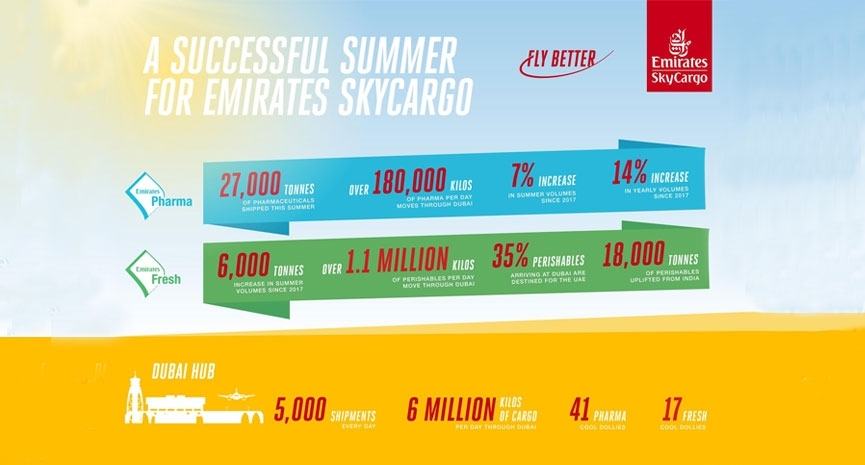Emirates SkyCargo carries 177k tonnes of perishables, pharma during summer
Emirates SkyCargo has transported a large volume of temperature-sensitive pharmaceuticals and perishables through Dubai to other parts of its global network this summer.

August 28, 2019: Emirates SkyCargo has transported a large volume of temperature-sensitive pharmaceuticals and perishables through Dubai to other parts of its global network this summer. In total, the air cargo carrier moved over 150,000 tonnes of perishables and 27,000 tonnes of pharmaceuticals through Dubai between the beginning of April and mid-August 2019.
Emirates SkyCargo has invested in developing modern and ‘fit for purpose’ infrastructure at its Emirates SkyCentral Dubai International Airport (DXB) and Dubai World Central (DWC) cargo terminals for cargo from passenger and freighter aircraft, respectively. This includes extensive cool chain facilities and dedicated storage space for pharmaceutical cargo. With a combined capacity of over 2 million tonnes of cargo per annum, the terminals see a movement of close to 5,000 shipments and over 6 million kilogrammes of cargo per day including during the summer season.
Since 2017, there has been an increase of 7 percent in the volume of pharma cargo transported during the summer months and an increase of 14 percent in the overall volume of pharmaceuticals transported throughout the year. This summer season alone, over 190,000 kilogrammes of pharma travelled every day through Dubai on Emirates SkyCargo. These include lifesaving vaccines, medication for cancer, diabetes and cardiovascular diseases that travel across the world through Dubai to reach patients in time for their treatment.
Over the last three years, Emirates SkyCargo has managed to consolidate the position of its Dubai hub as an efficient and rapid transit point for cargo originating from and destined to a variety of cities across six continents.
The carrier’s operations in Dubai, including its state of the art dedicated pharma facility at DXB, its freighter terminal at DWC and the connecting bonded trucking corridor between the two airports are certified for EU GDP norms.
Earlier this year, the air cargo carrier inaugurated a new ‘purpose-built’ pharma facility at Chicago airport. Chicago is one of Emirates SkyCargo’s most important pharma stations globally for both exports and imports.
Every day around 1,100 tonnes of food and other perishable products originating from different parts of the world move through Emirates SkyCargo’s terminals in Dubai. This summer, there was an increase of close to 6,000 tonnes in the total quantity of perishables passing through Dubai compared to 2017. Close to 35 percent of perishables arriving at Dubai are destined for the UAE with the rest travelling on to reach global consumers.
For example, the carrier uplifts specialty food produce from Italy including Parmigiano Reggiano and Buffalo Mozzarella cheese from Rome and Naples, Vignola cherries and kiwi fruit from Bologna and Modena, strawberries, fish and clam from the Venice area. In 2018, Emirates SkyCargo flew close to 3,000 tonnes of perishables just from Italy to the Middle East, Australia, New Zealand and other destinations in East Asia.
Emirates SkyCargo also helps local economies through the facilitation of exports of seafood. Since the start of its service to Santiago, Chile, Emirates SkyCargo carried over 4,000 tonnes of Chilean salmon equating about 20 percent of the total volume of salmon exports to Asian destinations.
One of the points of origin for perishables for Emirates SkyCargo is India. Every month, around 4,000 tonnes of fruits, vegetables and other perishables are moved from India on Emirates SkyCargo aircraft. Produce exported include summer fruits such as mangoes and guavas and vegetables such as okra, drumstick and chillies helping bring a taste of home to Indian expat communities in various markets. Since May 2019, Emirates SkyCargo has moved 18,000 tonnes of perishables from India alone.
Since 2016, Emirates SkyCargo has also introduced specialised transportation solutions - Emirates Pharma and Emirates Fresh which have met with considerable success with customers. Innovative equipment such as the air cargo carrier’s fleet of over 40 cool dollies for pharma and 17 cool dollies for perishables at the hub make sure that cargo is not exposed to temperature changes when being loaded or unloaded from the aircraft or being transported to and from the terminal.


